.jpg) |
| Wild clematis on the trail to the brink of Lower Mesa Falls |
Wait a minute, this is supposed to be a blog post about bird watching and the lead photo is a wildflower? This trip didn't start out as a bird watching trip or a wildflower excursion. We set out to show our sister, D'lynn some of the non-Yellowstone waterfalls in the area. Some of them are pretty spectacular. To get from our home in southeast Idaho to Yellowstone, we drive for about forty minutes through farmland and fifty minutes through the mountains. A wilderness paradise called Island Park. Some people think Island Park is Yellowstone Light, but those who take the time to explore it discover it has a peculiar beauty that is unique.
Rather than trying to categorize the images from this trip, I'll post them as we saw them. That's why there will be photos of Lower Mesa Falls followed by Upper Mesa Falls, followed by Lower Mesa Falls. I'll explain when we get to that point.
We started our trip by heading north on Highway 20 out of Rexburg, Idaho. At the town of Ashton we headed East on the Mesa Falls Scenic Byway. I've talked about that road before. The byway drops down Warm River Canyon and climbs up the side of the Island Park Caldera, which was one of the largest such volcanoes to ever exist. Dust from the eruption of this volcano has been found as a rock layer in Israel. This was a significant blast. Mount St. Helens ejected one cubic mile of ash which was significant. The Island Park Caldera ejected around 600 cubic miles of ash. It's a big volcano.
Molten material above ground cools very fast. Molten material below ground cools very slowly. The Island Park Caldera last erupted approximately 2.1 million years ago. The rock below is still emitting enough heat that the natural springs in Island Park, Idaho tend to be several degrees warmer than springs elsewhere. These aren't hot springs by any degree but they are warmer than most mountain springs. It's why they named the river Warm River.
Up near the top of the caldera is a turnout that offers a beautiful vista of the Tetons. We have stopped here many times, and there's always the temptation to not stop but since we had a newby with us it was a no brainer. The last several times we've stopped the sky has been overcast over the Tetons so the mountains kind of fade into the clouds. I'm hoping for a clear day sometime so I can photograph the Tetons from this vista with a bright blue sky. They look really good like that.
.jpg) |
| An old stone bridge in Warm River Canyon |
.jpg) |
| I believe this is a Triplet Lily, Triteleia grandiflora |
.jpg) |
| Sisters |
.jpg) |
| Wild Larkspur |
.jpg) |
| Seagull contemplating wading, floating, swimming and fishing |
.jpg) |
| Part of the Caldera |
.jpg) |
| The Tetons. Holding out for a clear day sometime from this spot. |
Leg #1: Lower Mesa Falls
The first major stop on the trip was at Lower Mesa Falls lookout. There's an overlook on the canyon rim that provides a very good view of the falls. I've posted it on this blog before, but I never get tired of seeing these falls, photographing them, talking about them and blogging about them. It's especially nice when we can introduce them to someone who has never before seen them.
.jpg) |
| Lower Mesa Falls from the scenic overlook |
Leg #2: Upper Mesa Falls
The next major stop along the scenic byway is Upper Mesa Falls. This is a pay area. It costs $5 to enjoy the upper falls. The five dollar fee is also good for Harriman State Park and Henry's Lake State Park. Cheap at twice the price. We walked down to Upper Mesa Falls. The trail is paved and after the canyon rim there are iron stairs and guard rails. There are several designated vantage points along the canyon rim for different views of the falls. We started with the brink of the falls and continued downstream, pausing at each location for photo ops. Upper Mesa Falls has been compared to Niagara Falls. It's the same type of waterfall. It's not as big but it is majestic in it's own way.
.jpg) |
| First lupine of the season |
.jpg) |
| Brink of Upper Mesa Falls |
.jpg) |
| Basalt on the canyon wall |
.jpg) |
| Not sure what this flower is but I like it |
.jpg) |
| Second view of the brink of the falls |
.jpg) |
| The side of the falls |
.jpg) |
| Further down |
.jpg) |
| First indication this was going to be a birdwatching day |
.jpg) |
| Huckleberry Ridge Tuff on the other canyon wall |
.jpg) |
| View from farther down the canyon |
.jpg) |
| From the falls looking downstream. File this picture under "Why I live in Idaho." |
Leg #3: Trail to the Brink of Lower Mesa Falls
Last year, I took two of my sons to the brink of the Lower Mesa Falls. We did it the hard way. We scrambled down the boulder field from the scenic overlook and climbed out the same way. While we were down there, however we found what looked like an easier way. The problem was the easier way would have put us out at the parking area for Upper Mesa Falls which was quite a ways away from the car. This year we hiked to the brink of Lower Mesa Falls the easy way.
We located the trailhead in the parking lot of Upper Mesa Falls and headed down the canyon. The trail was wooded and shaded for almost the entire way. It was only at the end when the trail ended up on the plateau that the tree cover ended. There were many wildflowers along the way, some I'd never seen before.
When we got to the plateau, the trail to the brink wasn't readily apparent so we scouted the rim until we found the way down. Upper Mesa Falls is serene, powerful and majestic. Lower Mesa Falls is wild and unpredictable.
We climbed out of the canyon to the plateau and headed back to the parking lot. It was an easy trail. A well developed trail with no real hazards except one deadfall. It's a trail I will take again, many times.
.jpg) |
| Near the trailhead |
.jpg) |
| Wild clematis, open |
.jpg) |
| Violet |
.jpg) |
| Upstream along the trail |
.jpg) |
| Picture doesn't do this justice. Sheer drop-off on the left for fifty feet or so |
.jpg) |
| Robin's egg. Hatched. More evidence this was a birdwatching day |
.jpg) |
| I believe this flower is called Arnica |
.jpg) |
| Moth or butterfly making a living on the trail |
.jpg) |
| More clematis |
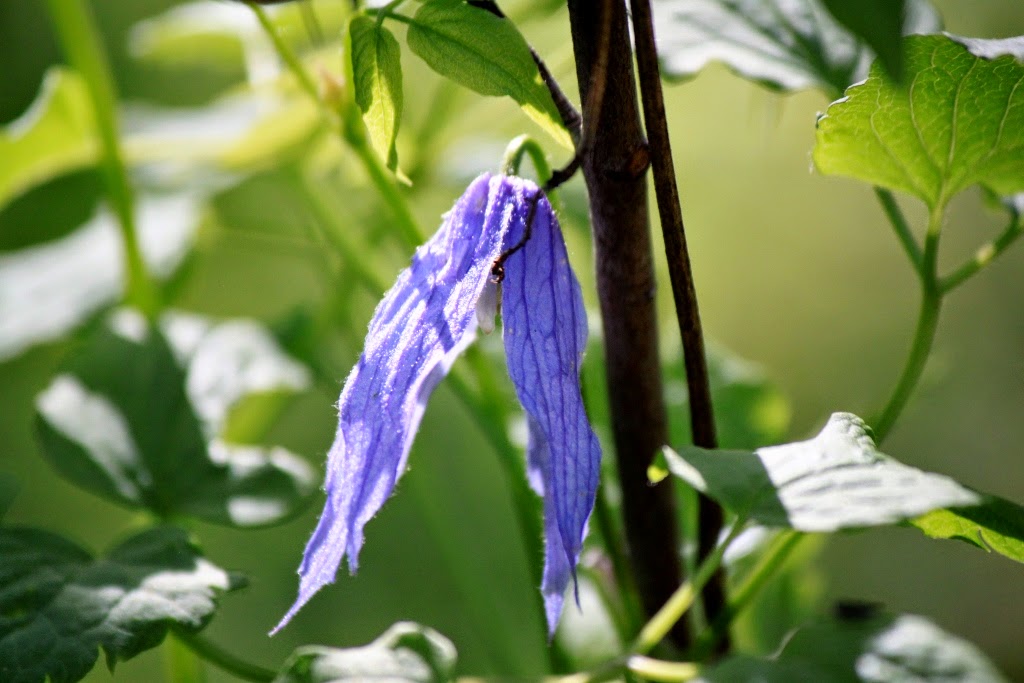.jpg) |
| I liked the light and shadow on this clematis blossom. Shows how delicate they really are. |
.jpg) |
| Pahoehoe lava. Fun to say, fun to spell |
.jpg) |
| Lichen on the basalt near the brink of the falls |
.jpg) |
| First viwe of |
.jpg) |
| Add caption |
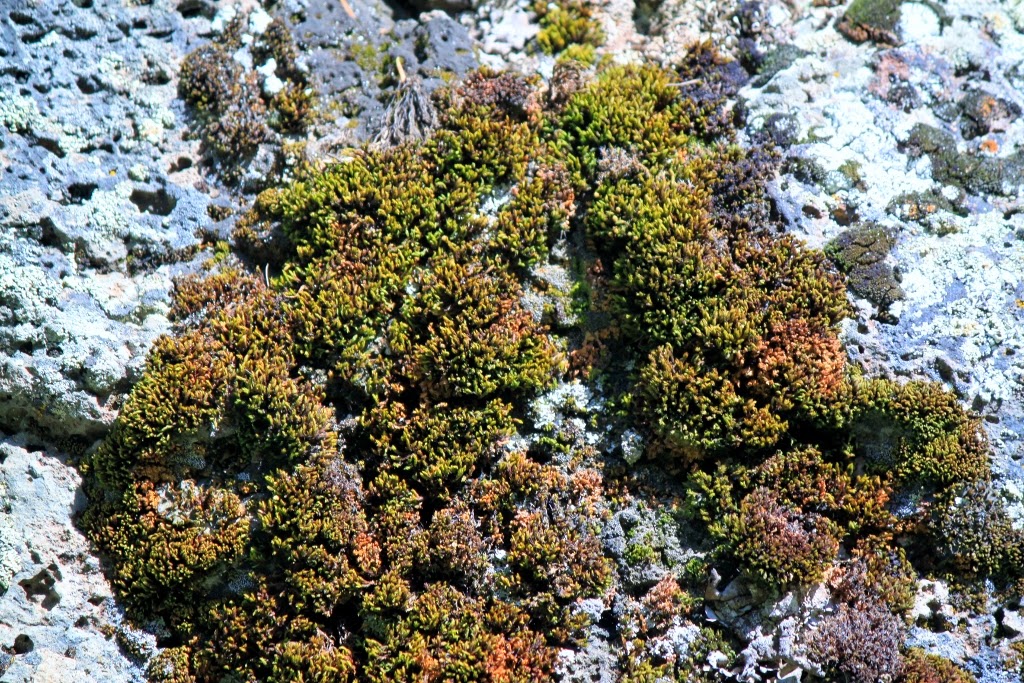.jpg) |
| Moss |
.jpg) |
| The girls climbing down through the notch |
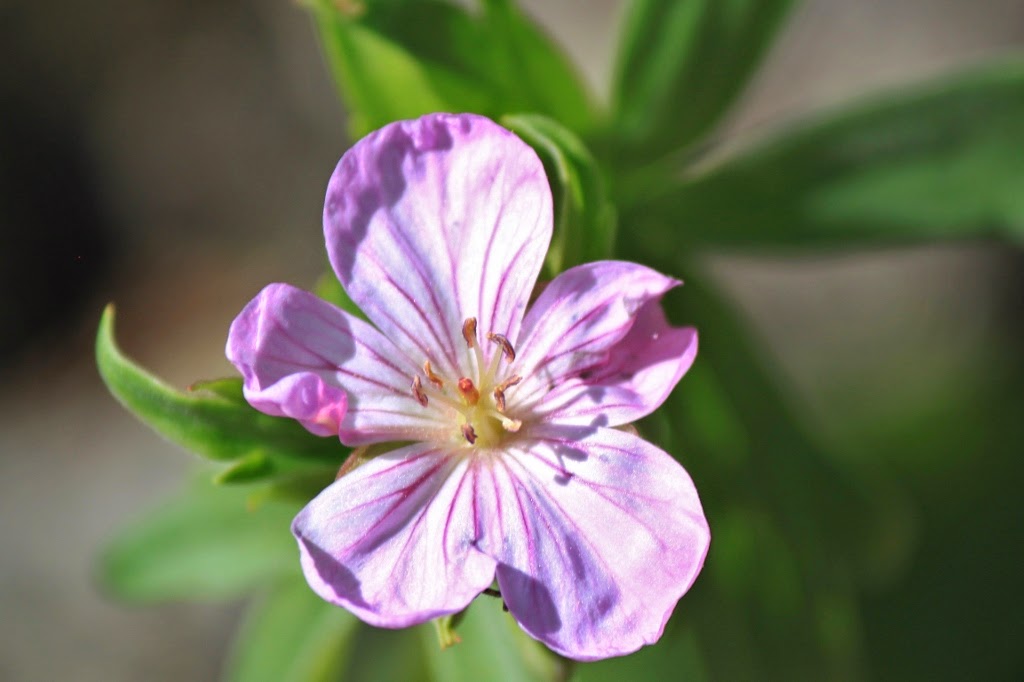.jpg) |
| First sticky geranium of the season |
.jpg) |
| Brink of the Lower Mesa Falls |
.jpg) |
| The sentinel. A column of rock that missed the erosion of an earlier waterfall |
.jpg) |
| First cataract |
.jpg) |
| The toilet bowl. I wouldn't want to ride a kayak down this, but people do. |
.jpg) |
| Lower Mesa Falls |
.jpg) |
| Some Bluebells of some sort down in a grotto about twenty feet below where we were standing. Not sure if sunlight ever penetrates this far. |
.jpg) |
| Rainbows |
.jpg) |
| Powerful waterfall |
.jpg) |
| This picture is clear evidence that I was actually on this trip |
.jpg) |
| Frothy scum at the brink of the falls |
.jpg) |
| I liked this part of the falls |
.jpg) |
| Another view of the sentinel |
.jpg) |
| Lower Mesa Falls as we hiked out |
.jpg) |
| Further down the trail |
.jpg) |
| and even further |
.jpg) |
| I believe this is called Beardtongue |
.jpg) |
| A varmint |
Leg #4: Serendipitous sidetrip
Several years ago we had been exploring some of the side roads in the caldera and we happened upon a field of blue wildflowers that was so dense it looked like water. In fact we thought it was water until we drove up to it and realized what it was. We had never been back to find that field, but had talked about it many times. As we headed down the scenic byway towards Harriman State Park, we happened upon a meadow densely packed with white wildflowers with patches of densely packed blue wildflowers. It still didn't equate to the original meadow from several years ago, but I decided to drive down the dirt road and view the flowers. At the end of the road there was a turnaround and a trail heading off to what looked like the rim of the canyon.
The canyon was beautiful from this vantage point, but the real intriguing thing were the birds circling overhead. I believe one of them was a peregrine falcon. They kept circling closer and closer until they were overhead. They appeared to be some kind of raptor. I took many photographs of them and when they were directly above me I saw the red, featherless head of a turkey vulture. It was a magnificent sight. There were at least a dozen of them in the canyon. I was excited to see them so close.
.jpg) |
| Meadow |
.jpg) |
| Patch of blue flowers in the midst of white flowers |
.jpg) |
| May be some sort of daisy |
.jpg) |
| The blue flowers are camas lilies. I had never seen them before |
.jpg) |
| This may be baneberry. Need more research |
.jpg) |
| Another camas |
.jpg) |
| Camas and the pollinator |
.jpg) |
| Ancient ox-bow lake, now filled in |
.jpg) |
| Infamous pine beetle |
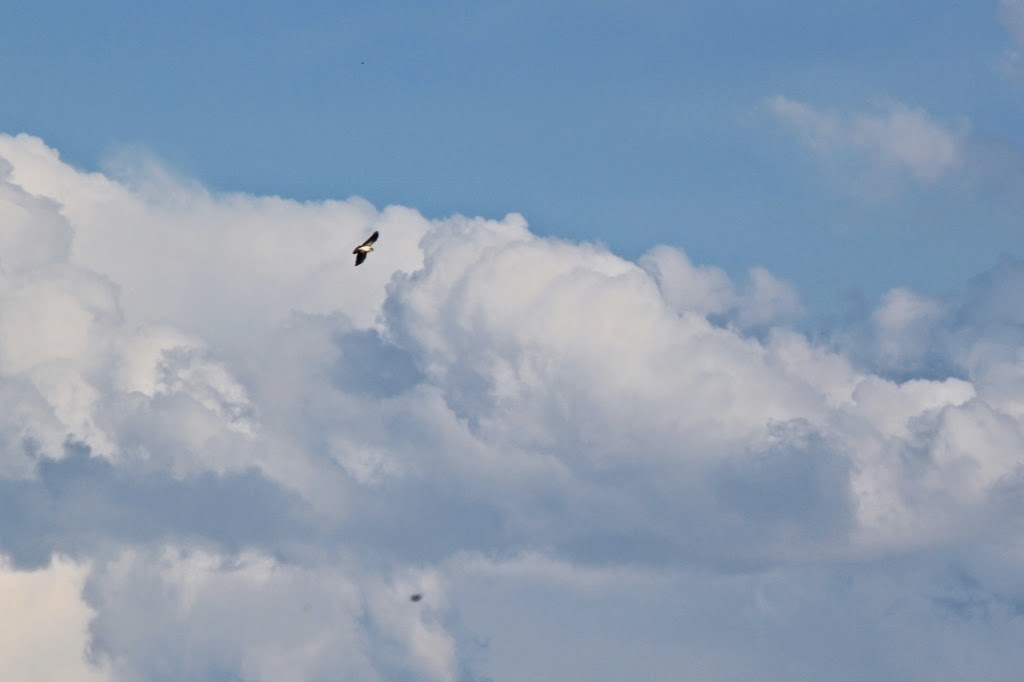.jpg) |
| I believe this is a peregrine falcon. Didn't get a closer look than that though. |
.jpg) |
| Circling birds |
.jpg) |
| Turkey vulture |
.jpg) |
| lots of pictures of these because I like them |
.jpg) |
| again |
.jpg) |
| once more |
.jpg) |
| repeat |
.jpg) |
| twins |
Leg #5: Harriman State Park
When we arrived at Harriman State Park, we elected to follow the Silver Lake Loop Trail because on the way in to the parking area we spotted several trumpeter swans. As we started down the trail, past the buildings and developed part of the park we happened upon a pair of trumpeter swans. The female was sitting on a nest and the male was very near her, possibly protecting her.
Later down the trail we spotted a sandhill crane. Swans and cranes mate for life and so I figured the mate must be nearby. A little further down the trail we spotted the mate. I believe our presence agitated her because she performed the broken wing act for us. Cranes, if they sense a predator too close to their nest will attempt to draw the predator away by feigning a broken wing. When the predator gets too close to the bird, it will fly away, thus protecting itself and it's young. I had seen the broken wing dance once before, when I was a teenager. I hope to see it again. For the record, we were never very close to either of the cranes. I used the zoom lens and then cropped the images.
The trail wound it's way around a knoll and then came around the west end of the lake. Shortly after we came back to the lake edge I spotted a young moose. Turns out it was a shy moose and didn't fancy having it's picture taken.
We saw several other swans, some nesting some swimming. It was getting late and we headed back to the car. At that point, across the road I spotted three great blue herons. Alas I was not able to get a photograph of them. They were flying away and by the time I brought the camera to bear they were gone.
.jpg) |
| Trumpeter swan and mate |
.jpg) |
| Reflective |
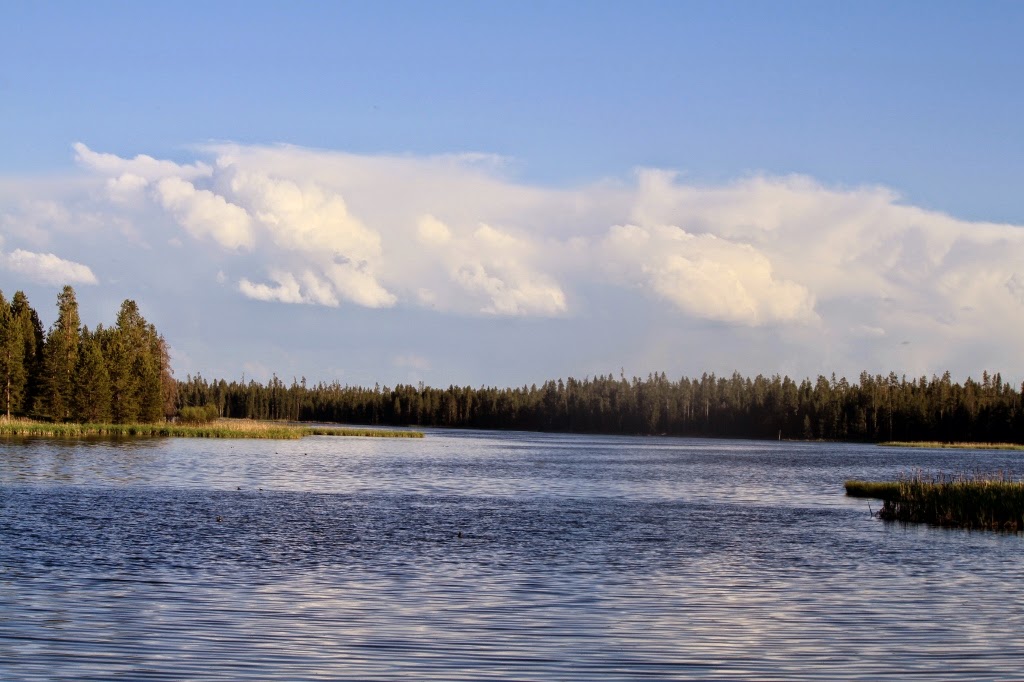.jpg) |
| Beautiful view |
.jpg) |
| The whole park is like this |
.jpg) |
| First sandhill crane |
.jpg) |
| more camas |
.jpg) |
| The broken wing dance |
.jpg) |
| Step 2 |
.jpg) |
| Step 3, the collapse |
.jpg) |
| Woodland Star |
.jpg) |
| Moss on the tree |
.jpg) |
| Awesome sky |
.jpg) |
| The moose, minding it's business |
.jpg) |
| Oh-oh, was that a twig snapping? |
.jpg) |
| I don't think that was supposed to happen |
.jpg) |
| climbing the bank |
.jpg) |
| Getting out of Dodge |
.jpg) |
| The sky reflected beautifully in the lake |
.jpg) |
| Footbridge on the trail |
.jpg) |
| The girls |
.jpg) |
| The trail |
.jpg) |
| Another trumpeter swan sitting a nest |
.jpg) |
| Sunset over Silver Lake |
.jpg) |
| Sunset over the mountains |
.jpg) |
| Last Swan of the day |
We have only just started going to Harriman State Park. Last year was our first time. We have fallen in love with it. Some friends of ours spend more time there than in Yellowstone. There aren't as many people in the summer months and it's a very good place for birdwatching. The trumpeter swans are year round residents of the park and someday soon I wish to rent a yurt there and snowshoe around Silver Lake to see the swans in winter. I think it would be very pretty.
This was a very nice trip. We didn't set out to see so many birds, it was serendipitous. I am happy we were able to share this part of the world with our sister. I think she had a nice time as well.
.jpg)
.jpg)
.jpg)
.jpg)
.jpg)
.jpg)
.jpg)
.jpg)
.jpg)
.jpg)
.jpg)
.jpg)
.jpg)
.jpg)
.jpg)
.jpg)
.jpg)
.jpg)
.jpg)
.jpg)
.jpg)
.jpg)
.jpg)
.jpg)
.jpg)
.jpg)
.jpg)
.jpg)
.jpg)
.jpg)
.jpg)
.jpg)
.jpg)
.jpg)
.jpg)
.jpg)
.jpg)
.jpg)
.jpg)
.jpg)
.jpg)
.jpg)
.jpg)
.jpg)
.jpg)
.jpg)
.jpg)
.jpg)
.jpg)
.jpg)
.jpg)
.jpg)
.jpg)
.jpg)
.jpg)
.jpg)
.jpg)
.jpg)
.jpg)
.jpg)
.jpg)
.jpg)
.jpg)
.jpg)
.jpg)
.jpg)
.jpg)
.jpg)
.jpg)
.jpg)
.jpg)
.jpg)
.jpg)
.jpg)
.jpg)
.jpg)
.jpg)
.jpg)
.jpg)
.jpg)
.jpg)
.jpg)
.jpg)
.jpg)
.jpg)
.jpg)
.jpg)
.jpg)
.jpg)
.jpg)
.jpg)
.jpg)
.jpg)
.jpg)
.jpg)
.jpg)
This is a wonderful blog entry that I found while looking for information on Harriman State Park. I am coming to the area in mid September and hope to visit here. Would you have any idea if the falls are as impressive in the fall and is it safe for a single person by themselves? Thanks fr any help you can provide.
ReplyDelete